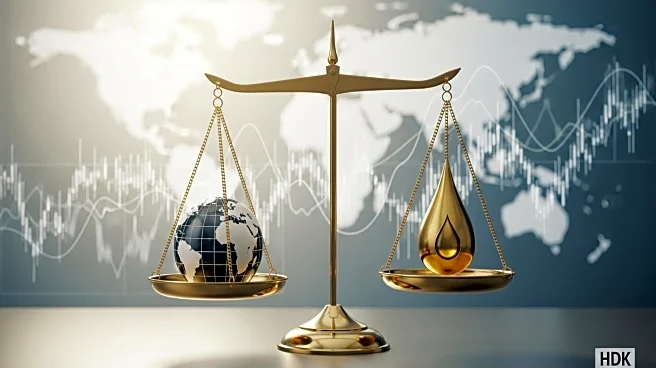What's Happening?
The global trading markets have experienced a period of relative stability following months of volatility. This week, oil prices saw a marginal increase of 0.17%, although they have dropped by 1.4% this month and 10.8% compared to the same time last year. The Baltic Exchange Dry Index reported declines in the Panamax and Supramax indices by nearly 2% and 3%, respectively, while the Cape index rose by almost 1%. Local steel plate prices have remained steady across most locations, despite fluctuations in currency values, particularly the weakening of the U.S. Dollar against key currencies. India has dominated LNG recycling sales, maintaining a steady inflow of tonnage, while Pakistan and Bangladesh face challenges in attracting coherent offerings.
Why It's Important?
The stabilization in global trading markets is significant for industries reliant on shipping and trade, as it may signal a potential easing of economic pressures. The fluctuations in oil prices and currency values impact the cost of goods and services, affecting both consumers and businesses. The dominance of India in LNG recycling sales highlights its strategic position in the market, potentially influencing global recycling practices and environmental policies. The challenges faced by Pakistan and Bangladesh in attracting market sales could affect their economic growth and development, emphasizing the need for infrastructure improvements and regulatory compliance.
What's Next?
As the global trading markets continue to stabilize, stakeholders may focus on adapting to the changing economic landscape. Countries like Pakistan may need to address regulatory and infrastructure challenges to remain competitive in the recycling market. The ongoing fluctuations in oil prices and currency values will likely influence future trading strategies and economic policies. Industry leaders and policymakers may seek to leverage the current stability to foster growth and innovation in the shipping and recycling sectors.
Beyond the Headlines
The stabilization of trading markets may have deeper implications for global economic trends, potentially affecting long-term investment strategies and international trade relations. The focus on LNG recycling sales in India could drive advancements in sustainable practices and environmental technologies. The challenges faced by Pakistan and Bangladesh highlight the importance of regulatory compliance and infrastructure development in maintaining market competitiveness.












